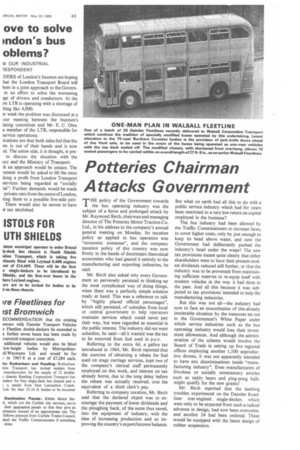Potteries Chairman Attacks Government
Page 45

If you've noticed an error in this article please click here to report it so we can fix it.
THE policy of the Government towards the bus operating industry was the subject of a fierce and prolonged attack by Mr. Raymond Birch, chairman and managing director of The Potteries Motor Traction Co. Ltd., in his address to the company's annual general meeting on Monday. Its taxation policy as applied to bus operation was "economic nonsense", and the company taxation policy of this country was now firmly in the hands of doctrinaire theoretical economists who had geared it entirely to the manufacturing and exporting industries, he said.
Mr. Birch also asked why every Government so perversely persisted in thinking-up the most complicated way of doing things, when there was a perfectly simple solution ready at hand. This was a reference to talk by "highly placed • official personages", which still persisted, of subsidies from local or central government to help operators maintain services which could never pay their way, but were regarded as essential in the public interest. The industry did not want subsidies, he said—all it wanted was the tax to be removed from fuel used in p.s.v.
Referring to the extra 6d. a gallon tax introduced in 1964, Mr. Birch reported that the exercise of obtaining a rebate for fuel used on stage carriage services, kept two of the company's clerical staff permanently employed on this work, and interest on tax already borne, due to the long delay before the rebate was actually received, cost the equivalent of a third clerk's pay.
Referring to company taxation, Mr. Birch said that the declared object was to encourage the payment of lower dividends and the ploughing back, of the sums thus saved, into the equipment of industry, with the idea of increasing production and so improving the country's export/income balance. But what on earth had all this to do with a public service industry which had for years been restricted to a very low return on capital employed in the business?
The bus industry had been allowed by the Traffic Commissioners to increase fares, to cover higher costs, only by just enough to keep its head above water, and now the Government had deliberately pushed the industry's head under the water! The new tax provisions meant quite clearly that either shareholders were to have their present modest dividends reduced still further, or that the industry was to be prevented from maintaining sufficient reserves to re-equip itself with modern vehicles in the way it had done in the past. And all this because it was subjected to tax provisions intended to help the manufacturing industries.
But this was not all—the industry had now to face an exacerbation of this already intolerable situation by the measures set out in the Government's White Paper under which service industries such as the bus operating industry would lose their investment allowances. And although the administration of the scheme would involve the Board of Trade in setting up five regional offices employing another 1,100 unproductive drones, it was not apparently intended to have any discriminations inside "manufacturing industry". Even manufacturers of frivolous or socially unnecessary articles such as teddy bears and ping-pong balls might qualify for the new grants!
Mr. Birch reported that the teething troubles experienced on the Daimler Roadliner rear-engined single-decker, which were only to be expected from such a radical advance in design, had now been overcome. and another 24 had been ordered. These would be equipped with the latest design of rubber suspension.




























































































































